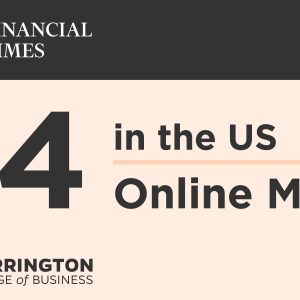UF MBA’s executive program earns top 10 publics distinction from Fortune
GAINESVILLE, Fla. – UF MBA has been named among the best on Fortune’s inaugural listing of the nation’s top executive MBA programs. The Executive MBA (EMBA) program at the University of Florida Warrington College of Business is the No. 10 program among public universities and the No. 24 program in the nation, according to Fortune.
This ranking from Fortune is the latest to attest to the strong quality of the Executive MBA program at UF. U.S. News & World Report named UF MBA the No. 9 program among publics. Poets & Quants and QS gave UF MBA’s Executive program top 20 rankings, No. 12 and No. 18 among publics, respectively.
Fortune’s Best Executive MBA Programs ranking was determined by three main components – a Fortune 1000 score (15%), a brand score (25%) and a program score (60%). The Fortune 1000 score is based on the number of alumni who are C-level employees at Fortune 1000 companies. The brand score is based on survey results of business professionals’ opinions of each school, while the program score is based on data of current students in each program, like how far along EMBA students are in their careers and selectivity metrics including GMAT score and average GPA of incoming students.
The UF MBA Executive program is designed with high-ranking business leaders in mind, with a management-focused curriculum taught by leading academics and researchers in the fields of management, marketing, finance, accounting, information systems and operations management, and beyond. The curriculum is intentionally designed to make its students in advanced careers impactful leaders in their industry and with an immediate ROI, which allows students to put what they’ve learned into action during their time at the office.
For Executive MBA alumna Leah Stokes (MBA ’20), who works with medical device company Medtronic, there were multiple benefits of earning her MBA while working, especially having a strong professional peer group who she could learn from outside of the classroom.
“[The most impactful part of my EMBA was] building relationships with classmates and team members [who] I have profound respect for,” Stokes said. “There are so many intangible benefits: Advice from peers on day-to-day work-related problems, bouncing ideas off each other outside of class, and less of a horse-blinder outsider perspective on industry trends is to be gained. I’ve become more open to change in my business that is experiencing paradigm shifts and become more of a positive proponent of embracing change with my work colleagues.”



